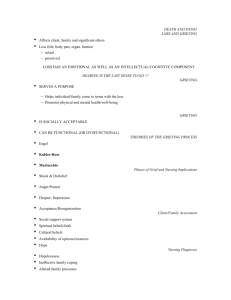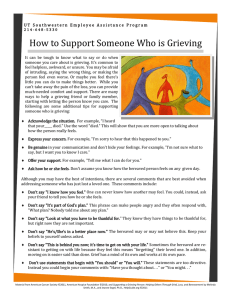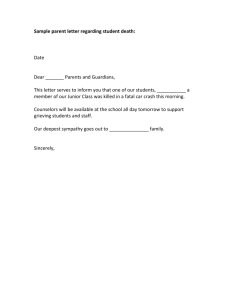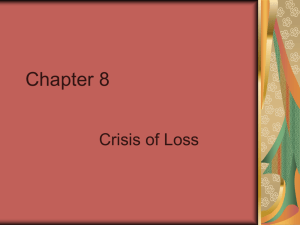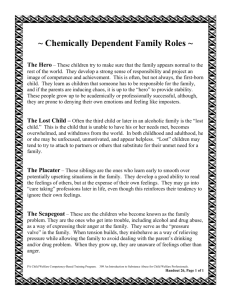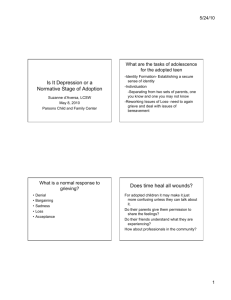About Bereavement
advertisement
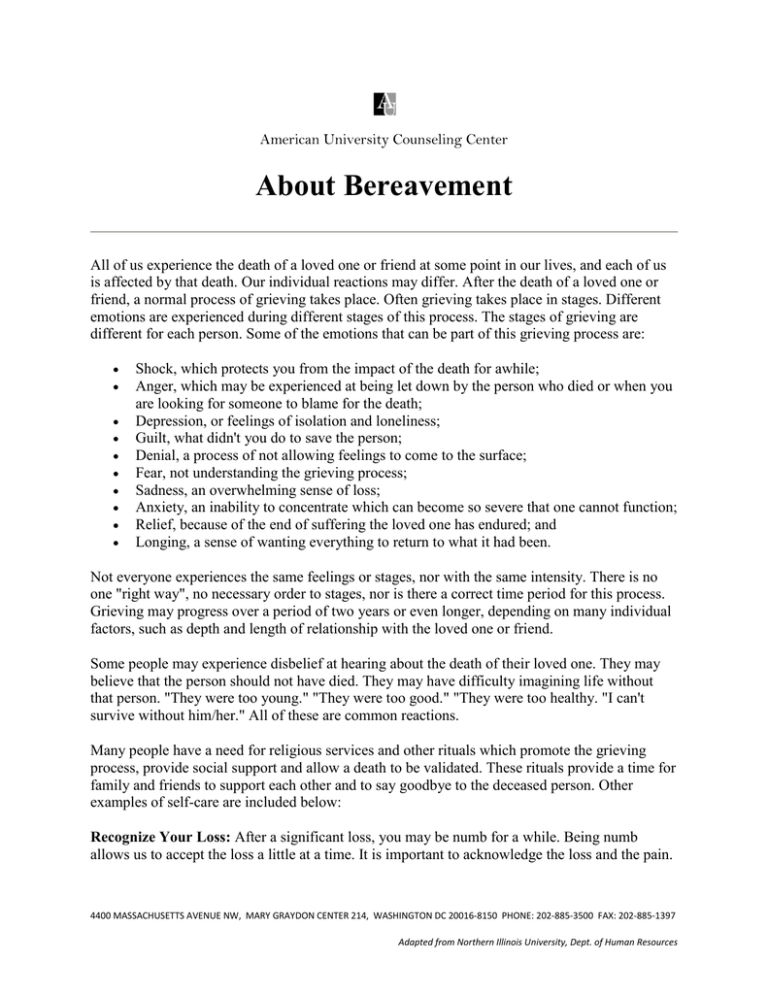
American University Counseling Center About Bereavement All of us experience the death of a loved one or friend at some point in our lives, and each of us is affected by that death. Our individual reactions may differ. After the death of a loved one or friend, a normal process of grieving takes place. Often grieving takes place in stages. Different emotions are experienced during different stages of this process. The stages of grieving are different for each person. Some of the emotions that can be part of this grieving process are: Shock, which protects you from the impact of the death for awhile; Anger, which may be experienced at being let down by the person who died or when you are looking for someone to blame for the death; Depression, or feelings of isolation and loneliness; Guilt, what didn't you do to save the person; Denial, a process of not allowing feelings to come to the surface; Fear, not understanding the grieving process; Sadness, an overwhelming sense of loss; Anxiety, an inability to concentrate which can become so severe that one cannot function; Relief, because of the end of suffering the loved one has endured; and Longing, a sense of wanting everything to return to what it had been. Not everyone experiences the same feelings or stages, nor with the same intensity. There is no one "right way", no necessary order to stages, nor is there a correct time period for this process. Grieving may progress over a period of two years or even longer, depending on many individual factors, such as depth and length of relationship with the loved one or friend. Some people may experience disbelief at hearing about the death of their loved one. They may believe that the person should not have died. They may have difficulty imagining life without that person. "They were too young." "They were too good." "They were too healthy. "I can't survive without him/her." All of these are common reactions. Many people have a need for religious services and other rituals which promote the grieving process, provide social support and allow a death to be validated. These rituals provide a time for family and friends to support each other and to say goodbye to the deceased person. Other examples of self-care are included below: Recognize Your Loss: After a significant loss, you may be numb for a while. Being numb allows us to accept the loss a little at a time. It is important to acknowledge the loss and the pain. 4400 MASSACHUSETTS AVENUE NW, MARY GRAYDON CENTER 214, WASHINGTON DC 20016-8150 PHONE: 202-885-3500 FAX: 202-885-1397 Adapted from Northern Illinois University, Dept. of Human Resources Be With the Pain: Feeling the pain after a loss is a normal part of living and loving. Denying the loss does not lessen the pain, it prolongs the suffering. Accept All Of Your Feelings, Even the Feelings You Don’t Like. Fear, anger, guilt, sadness, depression, despair, heartbreak, and an overwhelming feeling of disorganization are characteristic reactions to a significant loss. Avoiding feeling our emotions will mean our feelings will be expressed in unexpected ways. It Is Okay To Feel Anger: Everyone feels angry at a significant loss. Channel it wisely and it will go away as you heal. Walk, run, and exercise. If you find yourself more irritable, journal and explore what your anger is about. Anger is also a way for some people to avoid feeling the more vulnerable feeling of sadness. You Are Vulnerable, Be Gentle with Yourself: Invite help only from people who you know will be gentle with your feelings and can accept all of your feelings. You Are Not Alone, Seek Comfort As You Need It: Although you feel alone and grieving is an individual process, you are not alone. Grieving is a sad part of life everyone experiences. Accept support from others. Let them know what they can do to help. Healing Does Not Occur in a Smooth Line or on a Timetable: Healing occurs in phases where you move in and out of different feelings. Remind yourself that you can get through this. If it feels like you have been there long enough remember there is no way around grieving. You can only accept where you are in each moment and continue on your journey. Heal at Your Own Pace: Never compare yourself to another grieving person. Each of us has our own timing. Keep a Journal: Putting your thoughts and feelings on paper is a good way to get them out and both understand them and let them go. You can also look back and see where you have been, how you dealt with it, and get an idea as to where you are headed. Explore Your Beliefs: Clarify what is important to you…what brings you meaning. Reaffirm and explore your faith, spirituality, and values. This is a time for you to grow. Make an Intake Appointment at the Counseling Center: Processing feelings with a trained professional can help individuals cope with this loss and gain support in this difficult time. Tips for Coping: -Physical exercise along with relaxation will improve sleep and concentration. -Keep a journal -Talk to people; talk is one of the most healing activities. It is how we let go of stress. -Give yourself permission to feel rotten and share your feeling with others. -Give yourself permission to have moments of happiness or escape. -Spend time with others. Resist the temptation to isolate yourself. -Get plenty of rest and eat regular meals even if you don’t feel like it. 4400 MASSACHUSETTS AVENUE NW, MARY GRAYDON CENTER 214, WASHINGTON DC 20016-8150 PHONE: 202-885-3500 FAX: 202-885-1397 Adapted from Northern Illinois University, Dept. of Human Resources
